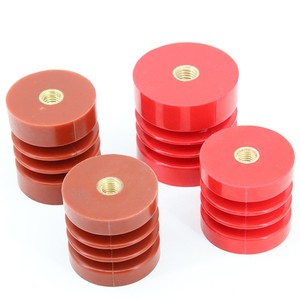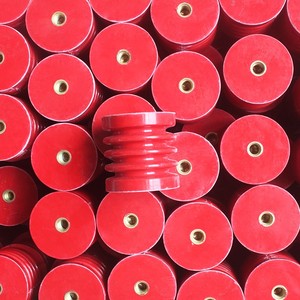
All categories
Featured selections
Trade Assurance
Buyer Central
Help Center
Get the app
Become a supplier

(827 products available)












































Liquid Epoxy Insulators
Liquid epoxy insulators remain formulated with a highly viscous liquid. This type of epoxy allows effortless application even in the most complex areas. The liquid state enables penetration into smaller crevices, making it highly durable when fully hardened. Liquid epoxies are extremely popular for application in electric motors, transformers, and circuit boards. It is here that deep and protective insulation penetration is needed.
Prepreg Epoxy Insulators
Prepregs exist as polymer matrix composites that are already partially cured. These materials are usually fibers that have been infused with epoxy resin. They are designed to be brought together and cured fully to allow for strong and durable components. They are often used in applications in aerospace and other electrical engineering fields. This is due to their strength and heat resistance properties.
Film Epoxy Insulators
Film insulating epoxy materials are thin and flexible. They offer good dielectric properties and excellent heat-resistance features. They are instead used in electrical devices where space is at a premium. They are good examples in wires and circuit boards. Their flexibility and thin nature allow easier layering within compact assemblies.
Castable Epoxy Insulators
Castable epoxies are designed to provide high viscosity with easy flow upon mixing and pouring into molds. They allow for complex shapes and full encapsulation for enhanced protection. Once cured, their rigid form attributes provide great mechanical strength. Their resistance to water and chemicals often makes them ideal for PCB and other electrical components protection.
High-Temperature Epoxy Insulators
These epoxies cure at elevated temperatures. They are ideal for applications with high thermal exposure. They offer excellent stability and retention of insulating properties. High-temperature epoxies are used in motors and aerospace components. Here, continuous operation at high levels of temperature is typically expected.
Chemical Resistance
Epoxy insulators maintain a great level of resistance to chemicals. These include oils, solvents, acids, and bases. This essentially makes them rather ideal for use in environments that require exposure to such chemicals. Their durability against chemical degradation extends therefore increases the lifespan of the devices they protect.
Moisture Resistance
Epoxy insulating paint provides an effective barrier against moisture. This helps prevent water penetration and thereby reduces the risk of electrical shorting. Additionally, it also helps to mold and corrosion. This property is especially important for applications that are in outdoor environments or those subjected to fluctuating humidity. They are good examples of outdoor electrical equipment.
Mechanical Strength
Once cured, epoxy insulators have a rigid and strong structure. They provide excellent protection against physical impacts or mechanical stresses. This includes shocks, vibrations, and general wear and tear. They offer protection for sensitive electronic components. This ensures that they are shielded from potential damage in both industrial and consumer applications.
UV Resistance
Some epoxy formulations are designed to be resistant to ultraviolet light exposure. They therefore prevent yellowing and degradation over time when placed under UV rays. This property is essential for outdoor applications. Here, prolonged exposure to sunlight can otherwise break down many insulating materials.
Heat Resistance
One of the extraordinary features of electrical epoxy is that it exhibits great resistance to heat. They are normally used in applications with high temperatures, such as electric motors and aerospace components. These epoxy insulators maintain their insulating properties and chemical structure. They are able to resist thermal breakdown, which will otherwise compromise insulation efficiency.
Growing Demand in Electric Vehicles (EVs)
The growing demand for electric vehicles is accompanied by a corresponding rise in the use of epoxy insulators within the EV market. Insulators are fundamental to the performance and safety of electric motors and batteries. Their ability to keep high efficiency and to keep safe is a major selling point in the adoption of EVs. Their success works well in reinforcing the growing trend towards green and sustainable transportation.
Cost Efficiency in Protection
In any production process, the costs incurred determine whether a business remains operational or is forced to close shop. Epoxy insulating coating protect the longevity of electronic components therefore make them a rather cost-effective solution in the long run. By reducing failures and repairs, they save manufacturers and end-users thus a great deal in maintenance costs. This enhances their value proposition in various competitive markets.
Expanding Telecommunication Infrastructure
As the telecommunications infrastructure expands, the demand for reliable insulating materials keeps growing. Epoxy insulators help to ensure the reliability and efficiency of circuit boards and other electronic components. This highly contributes to the performance of communication gadgets. Their application in such a rapidly progressing industry adds great commercial value to these insulators.
Miniaturization of Electronics
Owing to their versatility and ability to protect components in compact devices, epoxy insulators are essential in the miniaturization trend. This is more so in consumer electronics and industrial devices. Since the trend is going towards smaller devices, they enhance the value of these insulators. They allow for the continued functionality and high efficiency in the space-constrained designs.
Increasing Durability Requirements
There are ever-increasing demands for durability and reliability across industries such as automotive and aerospace. These industries require components that can withstand extreme conditions. They include fluctuating temperature and mechanical stress. Because of their exceptional resistance to heat, chemicals, and physical impact, epoxy resin electrical insulators meet these demands and thus enhance operational efficiency and reduce potential failure rates.
Consider the Type of Insulator
There are various types of epoxy insulators, each with its own unique properties and advantages. They include liquid, film, and prepreg insulators, among others. They each serve different purposes and are better suited to particular applications. Liquid epoxy type is good for coating or encapsulation. Castable epoxy is great for creating solid insulator components.
Assess the Electrical Properties
All electrical insulating materials have different dielectric constants. This makes it important to select an epoxy insulator with the desired dielectric constant and voltage breakdown strength. These factors directly influence the ability of the insulator to resist electric flow and will thus determine how much voltage it can securely handle. It is therefore critical to consider the operating voltage and other electrical characteristics of any given application.
Check Temperature and Environmental Conditions
E epoxy coated insulators perform well under normal temperatures. High-temperature performance becomes critical in those applications where the environment normally fluctuates significantly. There are specialized high-temperature epoxy insulators designed to retain their properties in such extreme cases. There are also those created to withstand harsh chemical and environmental exposure.
Evaluate Mechanical Strength and Durability
Since epoxy electrical insulators are meant to protect sensitive electronic components, they need to be very durable. They will need to withstand mechanical stresses and physical impacts, in addition to chemical exposures. For applications that require a high degree of mechanical stress, ideally, a high level of mechanical strength is needed in return. It will ensure that the epoxy used will not deform or crack over time.
Consider Curing Conditions
Some epoxy insulators need normal curing conditions, while others need more extreme high-temperature curing conditions. This means that one has to consider the available time and resources for curing. Ambient curing epoxy insulators hold a particular advantage in time-sensitive applications. In contrast, heat-curing epoxy may provide superior performance in those applications requiring peak efficiency.
Epoxy insulators are insulating materials that have been produced from epoxy resins. These resins provide electrical insulation, mechanical strength, and chemical resistance for various applications. They protect electrical components from short circuits and other electrical failures, among other things.
Epoxy insulators can either be cast, painted, or coated onto surfaces using various techniques. These techniques include molding, encapsulation, lamination, and infusion. The choice of manufacturing process predominantly depends on the type of insulator required and the specific application where they will be used.
The kinds of epoxy insulators are as follow: liquid epoxy insulators, prepreg epoxy insulators, film epoxy insulators, castable epoxy insulators, and high-temperature epoxy insulators.
Common applications include electrical insulation within electric motors, transformers, circuit boards, coils, and capacitors. They are also used for potting and encapsulation of electronic components and insulation in aerospace and automotive applications.
They have a high dielectric strength and low dielectric constant. Some of them exhibit excellent electrical insulating characteristics and do not allow the flow of electric current. This makes them ideal for a large variety of different applications.
One potential disadvantage is that the curing process can be time-consuming in some cases. Additionally, while epoxy insulators are generally durable, they may become brittle over extended exposure to certain environmental conditions. These include UV light or extreme temperatures.
While modern epoxy formulations have much lower emissions of volatile organic compounds, there is the juxtaposition that their production may still have environmental impacts.